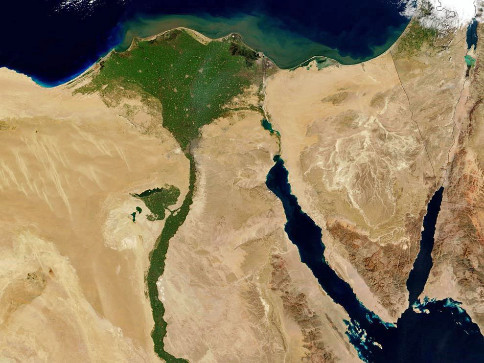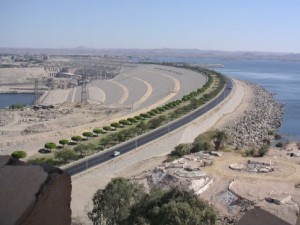 Photo of the Nile from space taken by NASA.
Photo of the Nile from space taken by NASA.
Water Security and the Nile Basin
Water security is a key issue for the world. It is the most basic form of security that a state requires, for without water there can be no state. The success of agriculture, health, industry, and energy all require a reliable source of water. As a result of climate change the water security of states is being increasingly threatened. An intelligence community assessment on global water security concluded that water security would be a key issue for the future, adversely affecting the economies and political stability of vulnerable states.
“During the next 10 years, many countries important to the United States will experience water problems—shortages, poor water quality, or floods—that will risk instability and state failure, increase regional tensions, and distract them from working with the United States on important US policy objectives. Between now and 2040, fresh water availability will not keep up with demand absent more effective management of water resources. Water problems will hinder the ability of key countries to produce food and generate energy, posing a risk to global food markets and hobbling economic growth.”
The impact of water security is perhaps most obvious in the Middle-East and North Africa. Yemen’s capital city of Sana’a is expected to be the first capital city to run out of water. Ethiopia, Sudan, and Egypt are all reliant on a single source of water, the Nile, for the sustainment of their infrastructures and economies. A threat to the Nile is tantamount to a threat to the state, and Egyptian officials have even gone so far as to say that, “building a dam is a declaration of war.” Water security is and will continue to be a major point of contention for the countries of the Nile basin.
Of the world’s total freshwater supply, 70% is used for agriculture. Of that, an estimated 60% is lost due to poor infrastructure such as leaky pipes. Agriculture is the biggest use of water, and is critical for states that are dependant on agricultural productivity. Ethiopia is one of those countries, with agriculture accounting for 45% of its GDP. On top of that, Ethiopia has energy and water shortages within its borders, and is assessed as “extremely vulnerable” to the effects of climate change. In order to resolve these problems, Ethiopia is looking to construct dams on the Nile as the answer—the biggest of which is the “Grand Ethiopian Renaissance Dam,” (GERD) which will hold 63 billion cubic meters of water, and produce 6000 megawatts of electricity.
Not surprisingly Egypt is greatly concerned that this dam project will have an impact on their water supply, and Egypt claims historic rights to three quarters of the water in the Nile due to a 1959 agreement. A limited flow of water to Egypt would threaten its crop production and food security. In general, a threat to the Nile is a major threat to Egypt’s water security, since it alone accounts for 97% of Egypt’s water supply.
Despite the rhetoric of conflict, water security has been and continues to be an issue that typically fosters cooperation rather than war. This is because the biggest barriers to water security are ones that cannot always be resolved through conflict, and the same is true for the ongoing dispute between Ethiopia and Egypt. More efficient water distribution infrastructure, enforceable regulation on the distribution of water, and development of alternative water sources (such as desalination) can all provide alternative solutions to outright war. In the case of Ethiopia and Egypt, a conventional war aimed at destroying the dam would probably cause more problems than it would solve.
Egypt is much better served by pursuing an avenue of cooperation, meeting some sort of agreement on the distribution of the benefits of the Nile as well as the benefits of the GERD. On March 6, 2015, Egypt, Sudan, and Ethiopia came to an agreement on the distribution of the resources of the Nile and the GERD. This agreement is set to be signed on March 23rd, and was described by the Sudanese foreign minister as “historic.” While the details of this agreement are not yet released, it is likely that it involves some measure of sharing the energy which will be generated by the dam, which could help to alleviate Egypt’s energy problems, which ASP has reported on. As water availability and conditions deteriorate in the Middle-East and North Africa, it is probable that water will become an increasingly contentious resource, and unless action is taken it will be a destabilizing element for the region.
Update: On March 23rd Egypt, Sudan, and Ethiopia signed a cooperation deal which asserts that the GERD will not harm the flow of water to countries downstream, as well as a hope that the dam will become a hub of energy for the region.







[…] Water Security and the Nile Basin Philip Rossetti Egypt is much better served by pursuing an avenue of cooperation, meeting some sort of agreement on the distribution of the benefits of the Nile as well as the benefits of the GERD. […]
[…] Water Security and the Nile Basin Philip Rossetti Egypt is much better served by pursuing an avenue of cooperation, meeting some sort of agreement on the distribution of the benefits of the Nile as well as the benefits of the GERD. […]